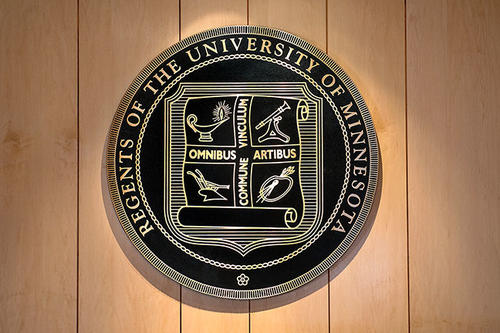University of Minnesota reviews response planning and forecasts of financial challenges surrounding global COVID-19 pandemic

During a videoconference meeting this morning, the University of Minnesota Board of Regents discussed the University’s response to COVID-19 and considered initial financial forecasts and potential options for addressing anticipated budgetary challenges, including the possibility of a tuition freeze for the 2020-21 academic year.
The Board also amended the start dates for the Comprehensive Student Fee Refund Plan, based on the recommendation of University administration. The plan will now prorate student financial credits for housing, dining and other fees starting from the first day classes were scheduled to resume after spring break (March 16 on the Duluth, Rochester and Twin Cities campuses, and March 23 at Crookston and Morris).
At its April 3 special meeting, President Gabel recommended — and the Board approved — prorated financial credits starting from March 28, the first full day of Governor Tim Walz’s statewide “Stay at Home” executive order, and continuing through the end of finals in May. Today’s change to the plan will increase the expected cost by $7 million, bringing the estimated total cost of the plan to $35 million.
“Since the COVID-19 pandemic began, the well-being of our students, faculty and staff have been at the forefront of every decision we have made,” said Gabel. “We are entering a new phase of response and preparation in which the long-term health of our institution — financial and otherwise — will share space among our top priorities. As we look to the immediate and long-term future, we are identifying ways to live within our means and make necessary but strategic sacrifices while maintaining the excellence that we and all Minnesotans can count on from their University.”
Limiting financial impacts
To partially offset increased costs and expected revenue losses, as well as to anticipate those the University may experience during the upcoming academic year, Gabel outlined initial actions to continue world-class excellence in education, discovery and outreach, while also minimizing staff reductions and maintaining employee insurance coverage.
Plans include:
- a voluntary 10 percent salary cut for President Gabel and her cabinet starting July 1 until the University returns to normal operations;
- one full week of unpaid work before June 30 for approximately 200 of the University’s senior leaders;
- subject to Board approval, a proposed salary freeze on merit increases and other adjustments during fiscal year 2021 for all University employees systemwide — not including labor-represented faculty and staff units with collective bargaining agreements.
These actions, which would provide an estimated $40-50 million in cost avoidance and savings, would be combined with other cost reduction strategies throughout the University and revenue-increasing activities, such as seeking reimbursements and refunds for third-party goods and services, identifying available departmental, unit and central balances to cover expenses, and potential Board of Regents action to leverage Central Reserves to assist in addressing this unprecedented situation.
Gabel also said she will ask all units across the University system to model reduced budget scenarios for the next academic year.
To explore future plans for revenue enhancement and cost-cutting, Gabel will charge two teams to begin work this week:
- A finance and operations team to focus on opportunities for operational and personnel cost savings, with an emphasis on maintaining employee headcount so the University is appropriately staffed and ready when regular operations resume;
- A mission-related team to focus on how the University curates its mission now to ensure it thrives in the future, including through potential new approaches to enrollment, programming and courses, research, and other efforts to ensure the University remains an attractive choice for top students, faculty and staff.
“I am grateful for the immediate willingness of system leaders to make personal financial sacrifices, and in their work for the good of our students and our University as a whole,” Gabel said. “The University’s contributions to our community and to the world only happen because of the creativity and commitment of faculty, staff and students. While we know we will face more difficult decisions as this pandemic unfolds, we will continue to serve the institution we are all so proud to be a part of and that our community deserves.”
Emerging financial challenges
It is too early in the COVID-19 pandemic to estimate with certainty the total financial impact to the University, even though the Board took its first in-depth look at estimated budget implications at today’s special meeting. The Board will focus more acutely on this topic and the University’s fiscal year 2021 budget in the coming weeks, as it plans for budget review in May and expected action in June.
To form a basis for future budget discussions, University leaders presented three scenarios of potential financial impacts.
- Based on a theoretical “best case” scenario where summer and fall activities returned to near-regular operations — an unlikely outcome given the University’s decision on Monday, April 6, to move all Summer 2020 courses to alternative instruction methods — this model anticipates approximately $77 million in projected revenue losses and expenditure increases across many units at the university.
- A moderate scenario that assumes extended reduced operations will continue through the summer, along with non-trivial effects lingering into the fall semester as the University transitions toward more regular operations. This scenario anticipates revenue losses and expenditure increases of approximately $163 million.
- A more difficult scenario in which reduced operations continue beyond the beginning of the Fall 2020 semester, a model that indicates the University may experience a financial challenge greater than $315 million.
Given the number of variables and unknowns involved in the pandemic, these scenarios are imprecise and meant for discussion and framing purposes only, University leaders said. Many of these variables are beyond the University’s control, such as the duration of the outbreak and any future pandemic resurgence. However, the scenarios illustrate a prevailing certainty that the financial challenges facing the University are significant and they will only grow as more time passes before the University resumes more routine operations.
Planning and expertise prepared University to respond effectively
Also today, Gabel acknowledged a few of the countless examples of ground-breaking work the University has undertaken in service to all Minnesotans and the world. The University has led the way on clinical trials for drug therapies, antibody testing development, engineering low-cost medical devices such as ventilators to supplement inventory shortages, innovative production methods for creating badly needed personal protective equipment, and sharing expertise on the virus and the outbreak’s broader implications. Examples of this work and more are available on the University’s COVID-19 Stories and Experts website.
Along with the rest of the country, the University was forced to transition quickly from preparation to decisive action as the situation surrounding COVID-19 has rapidly evolved. To its advantage, the University had existing plans and procedures in place as a foundation for real-time decision-making. For example, the University’s Health Emergency Response Office (HERO) utilized experience from the SARS epidemic and other infectious diseases to help Gabel, public health and infectious disease experts and other University leaders implement a decisive and transparent operational response that commenced in January, 2020. These efforts may be tracked on the University’s Safe Campus website.
The Board of Regents is scheduled to meet next on May 7-8, 2020. Visit regents.umn.edu for more information.
- Categories:
- Campus Affairs





